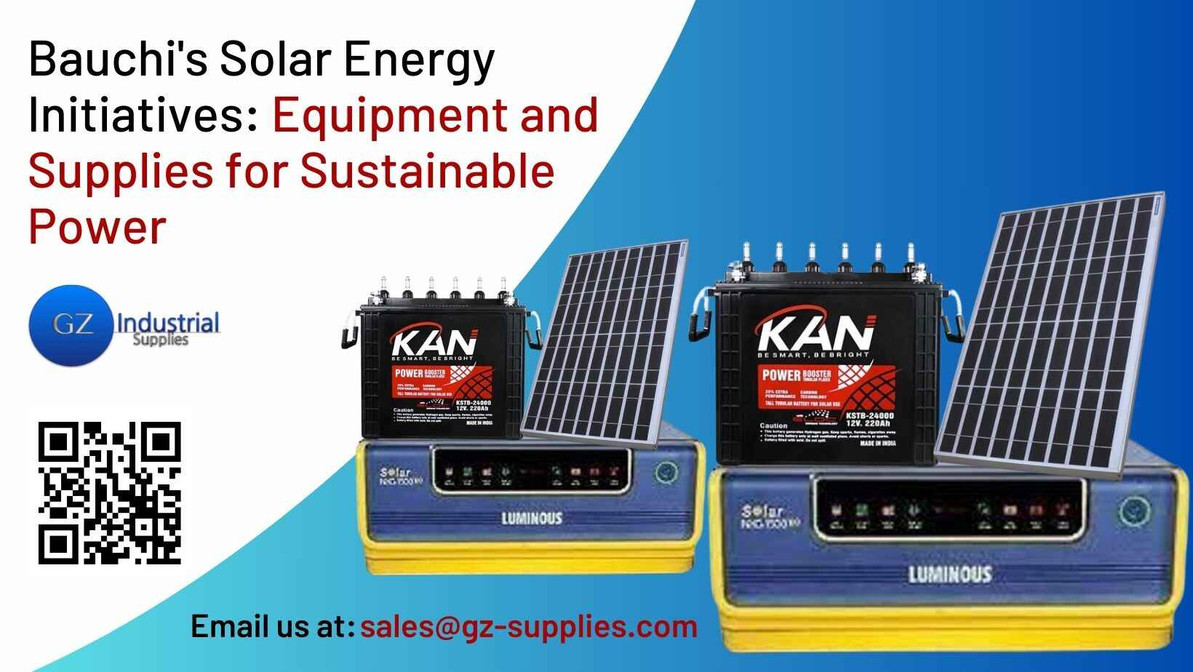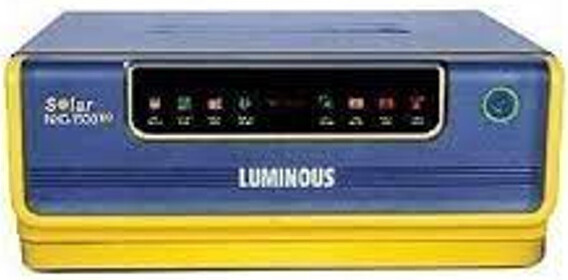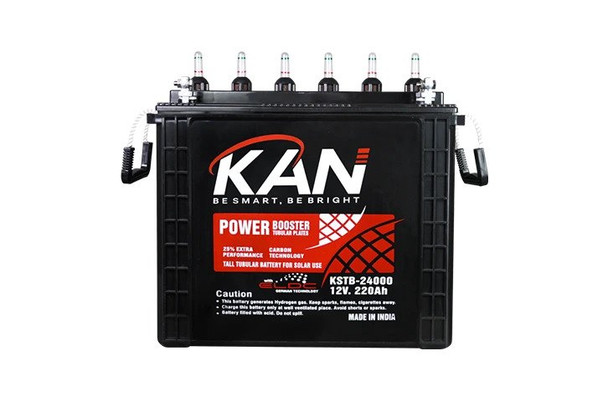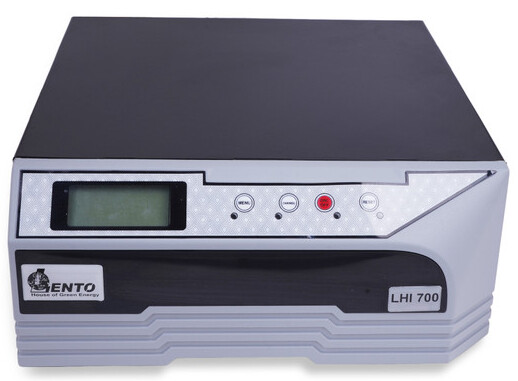Bauchi's Solar Energy Initiatives: Equipment and Supplies for Sustainable Power
Key Takeaways
- Energy Storage Solutions: Battery storage systems are critical in Bauchi’s solar initiatives, allowing users to store excess energy generated during the day for use during the night or periods of low sunlight.
- Off-Grid Solutions: Solar energy systems are providing off-grid solutions to remote areas in Bauchi, reducing dependence on the national grid and improving energy access in underserved regions.
- Cost-Effectiveness and Long-Term Savings: While the initial investment in solar equipment can be high, the long-term cost savings from reduced energy bills and minimal maintenance make it a financially viable solution for Bauchi's energy needs.
Introduction
Bauchi's solar energy initiatives are paving the way for sustainable power solutions, addressing the region's challenges with unreliable grid electricity. By harnessing solar power, Bauchi is reducing its dependence on fossil fuels and providing a cleaner, more reliable energy source for residential, commercial, and industrial sectors.
Essential solar equipment, such as photovoltaic panels, inverters, batteries, and mounting systems, are key to capturing and storing solar energy efficiently. In particular, battery storage systems allow for energy use during the night or periods of low sunlight, ensuring continuous power.
With government support, incentives, and a focus on off-grid solutions for remote areas, these initiatives are enhancing energy access, promoting long-term cost savings, and contributing to environmental sustainability by lowering carbon emissions. Bauchi's commitment to solar energy is positioning it as a leader in the transition to renewable energy in Nigeria.
This article explores Bauchi’s solar energy initiatives, the essential equipment and supplies needed to support sustainable power, and how the region is overcoming challenges to expand solar adoption. As solar power continues to rise in prominence, the availability of reliable equipment is crucial to ensuring the success of these initiatives.
LUMINOUS SOLAR HYBRID INVERTER 1.5KVA/24V
Current State of Solar Energy in Bauchi
Bauchi has made significant strides in implementing solar energy projects, particularly in rural communities that are underserved by the national grid. Both government initiatives and private sector investments have played key roles in this progress. For example, several community-based solar mini-grids have been established, providing clean, renewable energy to homes, schools, and healthcare facilities.
Key stakeholders in Bauchi’s solar energy movement include the state government, international development agencies, and private companies that supply and install solar equipment. Non-governmental organizations (NGOs) have also been instrumental in promoting solar energy, offering education and technical training to local residents on the benefits of solar power.
However, despite the positive developments, several challenges persist. These include the high initial costs of solar energy systems, a lack of technical expertise in some areas, and logistical difficulties in transporting equipment to remote regions. There is also a need for more comprehensive policies and incentives from both state and federal governments to support wider adoption.
Why Solar Energy is Essential for Bauchi
Solar energy holds immense potential for Bauchi’s economic and social development. With many rural areas still lacking reliable electricity, solar energy provides an affordable and accessible alternative to traditional power sources. Here are some of the key reasons why solar energy is vital for Bauchi:
1. Energy Access in Rural Areas:
Solar energy can reach remote communities that are not connected to the national grid, providing a stable and reliable source of power for lighting, refrigeration, and communication. This, in turn, improves living standards, education, and healthcare delivery in these areas.
2. Reducing Dependency on Fossil Fuels:
Like many regions in Nigeria, Bauchi has historically relied on fossil fuels for energy. However, solar energy offers a cleaner alternative that reduces greenhouse gas emissions and lessens environmental degradation caused by the extraction and burning of fossil fuels.
3. Economic Growth and Job Creation:
The development of the solar energy sector is creating new opportunities for employment in Bauchi. From the installation and maintenance of solar panels to the manufacturing and supply of related equipment, the solar industry is fostering local entrepreneurship and technical skills development.
SOLAR PANEL 250WATTS 24V POLY
Critical Equipment for Solar Energy Systems
The success of Bauchi’s solar energy initiatives depends largely on the quality and availability of essential equipment. Below is a breakdown of the most critical components in a solar energy system:
1. Solar Panels:
These are the heart of any solar power system, converting sunlight into electricity. Solar panels come in different types, with varying efficiencies and capacities. For Bauchi’s climate, which features high levels of sunlight, monocrystalline and polycrystalline panels are ideal as they provide excellent performance in both direct and diffuse light conditions.
2. Inverters:
Solar energy systems generate direct current (DC) electricity, which must be converted to alternating current (AC) for use in homes and businesses. Inverters perform this function, making them a key component of any solar system. Both string inverters (used in smaller setups) and central inverters (used in larger solar farms) are applicable in Bauchi’s solar projects.
3. Charge Controllers:
These devices regulate the voltage and current flowing from the solar panels to the batteries, preventing overcharging and extending battery life. In Bauchi’s solar mini-grids, charge controllers are essential for ensuring that solar energy systems remain efficient and reliable over time.
4. Batteries:
Energy storage is crucial for ensuring continuous power supply, especially at night or during cloudy days. Solar batteries store excess electricity generated during the day, which can then be used when sunlight is unavailable. Modern lithium-ion batteries are often preferred for their longer lifespan and higher efficiency compared to traditional lead-acid batteries.
5. Mounting Structures and Trackers:
Mounting systems secure solar panels to rooftops or the ground, while solar trackers adjust the position of panels throughout the day to follow the sun’s movement, maximizing energy capture. In Bauchi, where sunlight is abundant, using trackers can significantly increase the efficiency of solar power systems.
Kan 12v. 220AH Solar Tubular Battery
Supplies and Tools Needed for Installation and Maintenance
For solar energy systems to be successfully installed and maintained in Bauchi, reliable supplies and tools are just as important as the major equipment components. Proper installation ensures that solar panels operate at peak efficiency and remain durable over time. Here are some of the essential supplies and tools needed for solar energy projects:
1. Wiring and Cables:
The correct type of wiring is crucial for the safe transmission of electricity from solar panels to inverters and batteries. Solar power systems typically use specialized weather-resistant cables that can withstand exposure to sunlight and other environmental conditions. Proper cabling ensures that there is minimal energy loss during transmission and reduces the risk of short circuits.
2. Monitoring Systems:
Real-time data monitoring is key to the efficient operation of solar energy systems. Monitoring systems track the performance of solar panels, inverters, and batteries, providing users with insights into energy production, consumption, and potential issues. In Bauchi’s solar installations, these systems help optimize energy use and detect faults early, reducing downtime and repair costs.
3. Installation Kits:
Solar installation kits include essential tools like mounting brackets, bolts, screws, and grounding wires. These kits ensure that solar panels are securely fastened to roofs or ground mounts, minimizing the risk of damage from high winds or extreme weather conditions. They also provide the tools needed for proper electrical connections between system components.
4. Maintenance Equipment:
Regular maintenance is necessary to keep solar systems running efficiently. Cleaning supplies such as solar panel cleaning brushes and biodegradable detergents help maintain panel efficiency by removing dust, bird droppings, and other debris. Basic repair kits, which include replacement fuses, wiring tools, and voltage testers, are also essential for quick on-site troubleshooting.
Ensuring the availability of these maintenance supplies and tools in Bauchi is essential for the long-term sustainability of solar energy systems. Without proper maintenance, even the most advanced solar equipment can suffer from reduced performance and shorter lifespans.
Cleon Solar and Inverter Tall Tubular battery 12V 240AH
Solar Energy Success Stories in Bauchi
Bauchi has already seen notable success stories in its solar energy journey, with several projects improving the lives of local communities. These initiatives demonstrate the transformative potential of solar power in addressing energy access challenges in the region.
Rural Solar Mini-Grids:
One of Bauchi’s most impactful solar energy initiatives has been the installation of solar-powered mini-grids in rural villages. These mini-grids provide consistent electricity to homes and community centers, powering lighting, refrigeration, and communication devices. The success of these projects has improved education and healthcare services, as schools and clinics can now operate more effectively with reliable power.
Solar-Powered Water Pumps:
In several farming communities, solar-powered water pumps have been installed to provide a sustainable solution for irrigation. By replacing traditional diesel-powered pumps, these solar systems reduce operating costs for farmers and ensure continuous access to water, even during periods of fuel scarcity. This has contributed to improved agricultural productivity and food security in the region.
Public Facility Electrification:
Solar energy has also been used to power public facilities such as schools and health centers in Bauchi. For instance, a solar electrification project at a rural health clinic has enabled the facility to maintain cold storage for vaccines, improving healthcare delivery in the area.
These success stories highlight the potential of solar energy to drive social and economic development in Bauchi. As more projects come online, solar power is poised to become a cornerstone of the region’s energy strategy.
Challenges in Acquiring Solar Energy Equipment
Despite the numerous benefits of solar energy, there are significant challenges that must be addressed to expand its adoption in Bauchi. One of the most pressing issues is the high cost of solar equipment. While prices for solar panels and batteries have dropped in recent years, the initial investment required for a complete solar energy system can still be prohibitive for many households and businesses.
Another challenge is the availability of equipment and skilled labor. Importing solar components such as inverters, batteries, and specialized wiring can lead to long delays and increased costs due to import duties and logistics. Additionally, there is a shortage of trained technicians capable of installing and maintaining solar systems. Without sufficient expertise, there is a risk of poor installations that could compromise system efficiency or longevity.
Lastly, weather conditions and environmental factors must also be considered. Although Bauchi benefits from abundant sunlight, dust and high temperatures can affect the performance of solar panels over time. Regular cleaning and maintenance are necessary to mitigate these effects, but not all installations have easy access to the required maintenance services.
Lento Inverter 3000VA / 24V
Future Prospects for Solar Energy in Bauchi
The future of solar energy in Bauchi looks promising as emerging technologies and government initiatives continue to drive adoption. Some of the key trends likely to shape the region’s solar energy landscape include:
1. Emerging Solar Technologies:
New developments in solar panel materials, such as bifacial panels that capture sunlight on both sides, are expected to improve the efficiency of solar energy systems in Bauchi. Advances in energy storage technology, particularly in lithium-ion and solid-state batteries, will also enhance the reliability of solar power by providing better storage capacity.
2. Government Policies and Incentives:
The Nigerian government is increasingly focused on renewable energy, and Bauchi stands to benefit from national initiatives aimed at expanding solar energy access. Subsidies for solar equipment, tax incentives for solar projects, and partnerships with international donors are helping reduce the cost barriers for solar installations.
3. Community-Based Solar Projects:
Bauchi’s success with solar-powered mini-grids could lead to more community-based solar projects. These projects, driven by public-private partnerships and local entrepreneurship, provide a scalable solution for increasing energy access in off-grid areas.
By embracing these trends, Bauchi has the potential to become a model for sustainable energy in Nigeria. However, continued investment in infrastructure, education, and policy support will be crucial to achieving this vision.
Vecan electrical Cable 10mm Single Core (copper)
Frequently Asked Questions
1. What are the key benefits of solar energy for Bauchi?
Solar energy provides reliable electricity to rural areas, reduces dependence on fossil fuels, and stimulates economic development by creating jobs in installation and maintenance.
2. What type of solar panels are best suited for Bauchi’s climate?
Monocrystalline and polycrystalline solar panels are ideal for Bauchi, as they perform well under both direct sunlight and cloudy conditions.
3. How can solar batteries improve energy reliability?
Solar batteries store excess energy generated during the day, providing a continuous power supply during cloudy periods or at night, which is crucial for consistent energy access.
4. What challenges are faced when installing solar energy systems in Bauchi?
High equipment costs, limited availability of skilled technicians, and environmental factors like dust accumulation on panels are some of the key challenges.
5. How can Bauchi’s solar energy projects be scaled further?
Scaling can be achieved through community-based projects, government incentives, and international partnerships that provide financial and technical support.
Conclusion
Bauchi’s solar energy initiatives are a vital step toward ensuring reliable and sustainable power for the region. By adopting critical solar equipment such as panels, inverters, batteries, and monitoring systems, Bauchi can overcome its energy access challenges and reduce its reliance on fossil fuels. These efforts will not only improve the quality of life for local communities but also stimulate economic growth through job creation and improved infrastructure.
With the right support from government, private sector, and international organizations, Bauchi’s solar energy future is bright. Continued investment in high-quality equipment and the promotion of solar energy as a viable solution for rural electrification will ensure long-term success.
Ready to power your business or home with sustainable solar energy? At GZ Industrial Supplies, we offer high-quality solar panels, inverters, batteries, and all the equipment you need to ensure a reliable power supply in Bauchi. Contact us today to explore our range of solar products and get started on your journey to clean energy!
Recent Posts
-
The Ultimate Guide to Understanding the Difference Between Ethylene Glycol and Propylene Glycol
Introduction Glycols are versatile compounds widely used across various industries, from automotive …Apr 16, 2025 -
What are Agricultural Machinery
Introduction Agricultural Machinery is also used to improve the wide range of production prac …Apr 14, 2025 -
The Best Electrical Wire in Nigeria 2025 (Updated)
Introduction Electrical wires are the basic unit of every electrical system. Electrical wires …Apr 14, 2025












